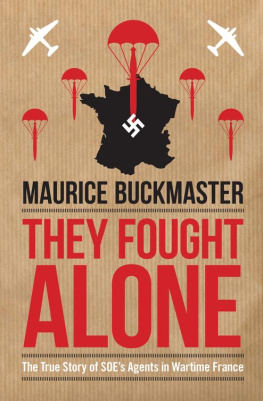
To Jacques and our children,
Olivier, Herv, Marie-France, Yves-Michel and Christophe
Contents
PART ONE
Secret Lives and Loves in War-torn Britain
PART TWO
The Aftermath of War, the Dream and the Reality
Foreword
A few years ago, I was researching my book, A Brilliant Little Operation, about Operation Frankton, the top-secret raid on German ships in Bordeaux harbour in 1942. Id grown up on the extraordinary story of the Cockleshell heroes. Indeed, without them I would never have served in the Special Boat Service, which was formed in the aftermath of their exploits. But what I discovered was that, at the same time as the marines were carrying out their attack, an SOE team of six British officers was a hundred yards away in a caf about to do the same thing. I was intrigued and wanted to find out more. In the course of uncovering this extraordinary story, someone suggested I should contact Noreen Riols, one of the few people still alive who was actually involved in the SOE. I fell in love with her immediately, read her previous books and told her that she should write another about her life. She replied she was already doing just that and here it is!
Today, Noreen is a charming white-haired grandmother with a remarkable twinkle in her green eyes, and a wonderfully witty raconteur. But in the 1940s, still in her teens, she was a key member of SOE. As one of the few surviving members of F Section, her knowledge of the organization and its operations was crucial in helping me understand exactly how Operation Frankton came about.
Perhaps it is her nature, perhaps it is the training which filters into the operatives DNA; Noreen has always downplayed her role in SOE. She is being far too modest. Without people like Noreen the SOE would not have achieved what it did. Her primary, although not unique, task was to be a decoy girl (she is the last living decoy) testing potential agents, deploying clandestinely to France, on their cover stories. This was vitally important because if they got it wrong they, and others, would die. Noreen played other roles in the organization, including the delivery of the weird and wonderful coded messages that were broadcast by the BBC every evening to tell agents that operations were on, training new agents in the not always gentle art of espionage, despatching them off on their missions and helping to debrief them on their return. She and the others worked tirelessly and often at personal cost.
SOE was acknowledged by no less a man than Eisenhower as having played a key part in the winning of the war on the western front which began in France on D-Day. Without it, and all those who worked for it, the Second World War might have ended very differently. I am, therefore, delighted that Noreen has finally agreed to write a memoir of her experiences during the war. Like her, it is witty, vivid and unsentimental, and it is also a story of remarkable courage and determination.
Paddy Ashdown, May 2013
Lord Ashdown of Norton-sub-Hamdon
Acknowledgements
Very special thanks to my dear friend Elspeth Forbes-Robertson, who, with endless patience, answered my calls for help and correction, researched and always promptly came up with the right answer and also checked the finished manuscript at least three times in order to detect any lapses of memory on my part; to my great friend Lizzy Buchan, who not only introduced me to my agent Andrew Lownie, for which I shall be eternally grateful, but also pushed me to write this book; last but certainly not least, to Georgina Morley and her wonderful team at Pan Macmillan, whose help and enthusiasm brought these pages to life; and, as always, to Jacques, my husband, who has encouraged and supported me throughout. To all of them, a very big thank you.

Prologue
In June 1940 France fell, and a great slice of Europe was now in German hands. With Soviet Russia as his ally, Hitler was confident that the collapse of Britain was imminent and that a German invasion of the island would be a mere formality. But he hadnt bargained for the bulldog spirit of Winston Churchill, that visionary who had predicted the threat of German aggression seven years earlier. At that time, he and Anthony Eden had been lone voices crying in the wilderness, for the most part ignored or scorned by the British parliament. But in May 1940 Neville Chamberlain, who had naively believed Hitlers promises of non-aggression, was forced to resign and Churchill succeeded him as prime minister. Almost immediately he defiantly declared, We will never surrender. His determination fired and inspired the British nation throughout the war.
Churchill understood from the very beginning that this war was going to be different from any other war Britain had ever fought. Only he had the foresight to see that the soft-shoe approach of MI6, the official intelligence service, would no longer be effective. The gentlemanly warfare Britain had always fought was not possible: that age was over, and only ungentle-manly schemes would succeed. Influenced by the German infiltration of agents into Europe during the 1930s which had been so successful that almost every foreigner in Britain was suspected of being a fifth columnist Churchill called upon his close advisers to immediately organize such an army, a subversive guerrilla force, responsible directly and only to him. The Special Operations Executive, also known as Churchills Secret Army, was born, and its first leader, Hugh Dalton, was instructed by Churchill to to set Europe ablaze.
Its founding was not the subject of parliamentary approval. Its budget and its very existence were secret: indeed secrecy became SOEs code, and its officers used aliases when attending government or other business meetings. SOE was a shadow world in which truth, as Churchill said, had to be protected by a bodyguard of lies. This secret army was to cover every occupied European country and, working behind the Germans back, carry out acts of sabotage and disrupt their means of communication. It would be Churchills fourth fighting force, along with the Navy, the Army and the Air Force. To be sure of victory, Churchill needed an army of bandits, to use MI6s derogatory name for the SOE. And they were right: we were trained to be bandits.
SOE was destined to fight a war on three fronts. It had not only Germany as an enemy, but also General de Gaulle and MI6. Often in a war there are minor wars being fought beneath the surface. The enmity often bitter, even destructive between SOE and General de Gaulle could be described as one of these minor wars.
As the only woman survivor in France of SOEs F (for France) Section, I am often asked to share my memories with various audiences in both France and England. I always accept these invitations, since I consider it not only my duty, but also my privilege to tell the story of the courage and dedication of so many unsung heroes and heroines, many of whom I knew personally, who fought clandestinely for France, and for freedom.
When SOEs secret files were opened to the public in the year 2000, the media and many historians were drawn to the subject. Since then, I have been interviewed by both print and broadcast journalists, all eager to know, from a former recruit, what happened in the shadows during the war years.
Countless stories have been written and many films and documentaries made on SOE operations in occupied Europe. But, as far as I know, very little has been told of how these operations were organized back in England. I was part of them, sharing many tense moments with agents not only before they were infiltrated behind the lines into enemy territory, but also on their return from these missions. One of the highlights of my time in SOE was having the opportunity to meet so many men and women, both pilots and agents, who were totally dedicated to their high-risk missions, and to witness their amazing achievements, mostly unknown outside the racket, and, even today, often unrecognized.
Next page








